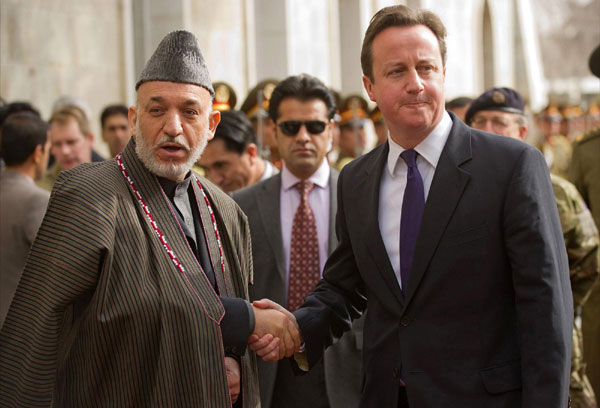Top News
British PM eyes 2011 Afghan pullback
Updated: 2010-12-08 15:12
(Agencies)
|
 Britain's Prime Minister David Cameron (R) shakes hands with Afghan President Hamid Karzai on arrival in Kabul, Afghanistan Dec 7, 2010. [Photo/Agencies]
|
KABUL - British Prime Minister David Cameron, on an unannounced visit to Afghanistan, said on Tuesday he was confident British troops could start leaving early next year when a gradual transition to Afghan forces begins.
|
||||
While he has said before he wants that process to begin next year, British commanders have since tried to play down the prospect of any major withdrawals in early 2011, saying this would depend on the readiness of Afghan forces to take over and other conditions on the ground.
"What I've seen on this visit gives me confidence that our plans for transition are achievable," Cameron told a news conference in Kabul alongside Afghan President Hamid Karzai.
Cameron said progress had been made in 2010 but added that 2011 must be "a decisive year for the campaign" and noted NATO's commitment, signed at a summit last month, for foreign forces to begin pulling out next year. As Cameron and Karzai spoke, US Defense Secretary Robert Gates arrived for a visit, on which he told troops that gains were being made but warned of a long, tough fight ahead.
A frequent visitor to Afghanistan, Gates is making his latest trip as President Barack Obama reviews his war strategy, and a few days after the president himself flew to Afghanistan.
Gates travelled to two US bases in the east, and in an emotional speech to troops at one of them, said he felt responsible for sending them to the conflict and was concerned for their well-being.
"This is a tough terrain and a tough fight, but ... we are breaking the momentum of the enemy and we will reverse that momentum, it will be a while and we'll suffer tougher losses as we go," he said at the base in Kunar province.
Gates will also meet Karzai and US and NATO commanders.
At a conference in Lisbon last month, NATO leaders agreed to meet Karzai's timeline for foreign troops to end combat operations in Afghanistan by the end of 2014. Some US and NATO leaders have warned that may spill into 2015.
The NATO summit agreement has thrown the spotlight onto the readiness of Afghanistan's roughly 260,000 police and soldiers to take over from foreign forces.
Some foreign commanders acknowledge there are problems with training, equipment and retention rates and that a target of 306,000 for Afghan forces by October 2011 will be hard to meet.
Cameron and General David Richards, the head of Britain's armed forces, painted an upbeat picture of progress in training Afghan forces. Cameron also saw progress in securing Helmand province, a Taliban stronghold in the south where some of the hardest fighting has been waged in the past year.
"There are more markets open, more children going to school, local government providing legitimate governance with the local population rejecting the brutal shadow Taliban regime," he said.
"Of course there is no scope for complacency because progress is still fragile. But I am cautiously optimistic."
Success at a price
US commanders have also reported signs of progress in the war since September, when the United States completed deploying the 30,000 additional troops Obama authorised last year. The United States now has about 100,000 troops in Afghanistan out of a total foreign contingent of about 150,000.
Military and civilian casualties, however, are at their worst levels since the Taliban were ousted in late 2001, despite the presence of a record number of foreign forces.
This week, a poll by four major international news groups found Afghans are more pessimistic about the country's direction, less confident that foreign troops can provide security, and more open to talks with the Taliban.
Analysts and observers also say the increasingly unpopular war is widely seen as going badly for Washington. European NATO leaders, like Cameron, are under pressure to withdraw troops.
Cameron, making his second visit to Afghanistan as prime minister, reiterated his deadline of having no British troops in combat operations by 2015.
Britain has about 9,500 troops in Afghanistan, most in Helmand, where they were spread thinly until Obama authorised the extra US troops, 20,000 of which are in southern provinces. British troops have since been able to concentrate on smaller, strategic areas of Helmand.
At least 346 British troops have been killed in Afghanistan since 2001, almost a third of them this year. Casualty rates among foreign troops have risen dramatically, particularly in the south and east, since July 2009 as NATO-led forces mounted more operations against Taliban-led insurgents.
Cameron, who arrived on Monday, shrugged off recent criticism of the troops' performance, saying they had been spread too thinly before the extra US troops arrived.
Afghan and US embassy comments, obtained by the WikiLeaks website, said British troops "were not up to the task" of securing Helmand.
"When you look at what was said, it was relating to a previous period, when we all know now there weren't enough troops in Helmand," Cameron said in Helmand late on Monday.
E-paper

Ear We Go
China and the world set to embrace the merciful, peaceful year of rabbit
Preview of the coming issue
Carrefour finds the going tough in China
Maid to Order
Specials

Mysteries written in blood
Historical records and Caucasian features of locals suggest link with Roman Empire.

Winning Charm
Coastal Yantai banks on little things that matter to grow

New rules to hit property market
The State Council launched a new round of measures to rein in property prices.




